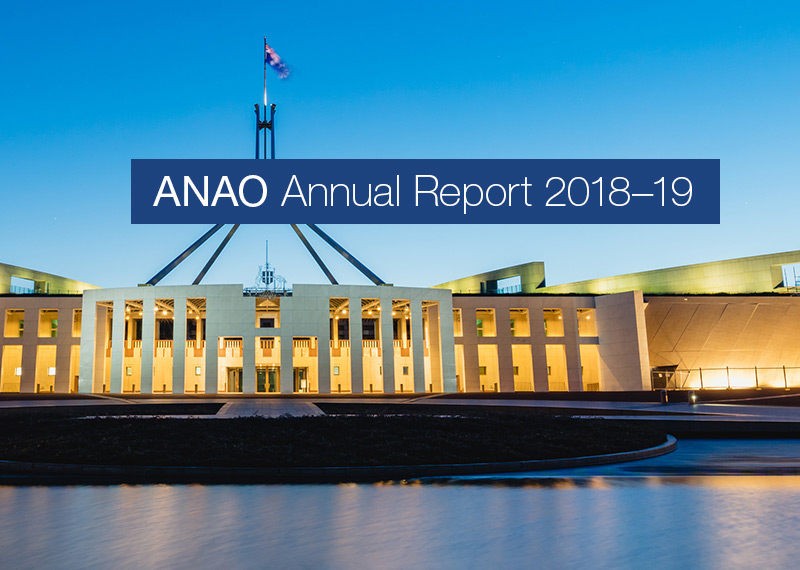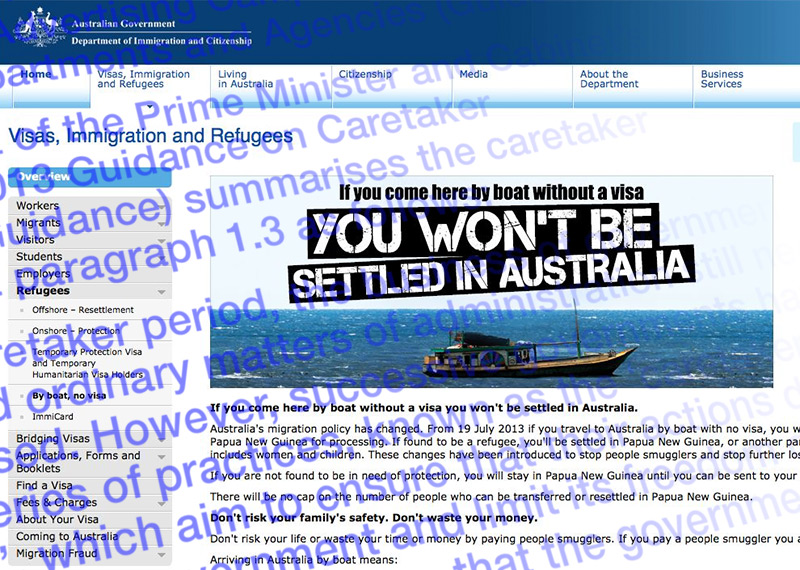Browse our range of reports and publications including performance and financial statement audit reports, assurance review reports, information reports and annual reports.
All persons, other than Australian nationals, are required to hold a visa to enter and stay in Australia. This audit's focus is on the entry component of the visa process and specifically the Electronic Travel Authority (ETA). The ETA is an electronically-stored authority for travel, which facilitates the entry of tourists and short-term business travellers from countries where the risk of non-compliance with visa conditions is low, that is, in countries classified as ‘low risk'. The objective of the performance audit was to assess the administrative effectiveness of the ETA.
The audit objective was to assess the effectiveness of the development and administration of the Fifth Community Pharmacy Agreement (5CPA), and the extent to which the 5CPA has met its objectives.
Please direct enquiries relating to reports through our contact page.
This annual report documents the performance of the Australian National Audit Office (ANAO) in the financial year ended on 30 June 2019. The report addresses all applicable obligations under the Public Governance, Performance and Accountability Act 2013; the Public Governance, Performance and Accountability Rule 2014; the Auditor-General Act 1997; the performance measures set out in the outcome and programs framework in the ANAO’s Portfolio Budget Statements 2018–19 and the ANAO Corporate Plan 2018–19, and annual reporting requirements set out in other relevant legislation.
Please direct enquiries relating to annual reports through our contact page.
The objective of this audit is to assess the effectiveness of the Department of Climate Change, Energy, the Environment and Water's (DCCEEW) corporate plan as its primary planning document in accordance with the Public Governance, Performance and Accountability Act 2013.
Please direct enquiries through our contact page.
The slides and video from the Chief Financial Officer Forum held on Friday 8 July 2022 are now available. Please also provide any feedback you’d like to see incorporated in future forums.
For any enquiries, please contact External.Relations@anao.gov.au
The slides and video from the Chief Financial Officer Forum held on Friday 26 November 2021 are now available. Please also provide any feedback you’d like to see incorporated in future forums.
Please direct enquiries through our contact page.
The slides and video from the Chief Financial Officer Forum held on Friday, 27 November 2020 are now available. Please also provide any feedback you’d like to see incorporated in future forums.
Please direct enquiries through our contact page.
Response completed as a limited scope assurance review.
The Auditor-General responded on 2 September 2015 to correspondence from Senator Nick Xenophon of 3 June 2015 on the Australian bid for the football World Cup.
Please direct enquiries relating to requests for audit through our contact page.
The Auditor-General responded on 14 August 2013 to correspondence from Senator Nick Xenophon of 12 August 2013 on the continuation of the Australian Government’s By boat, no visa advertising campaign during the caretaker period.
Please direct enquiries relating to requests for audit through our contact page.
The objective of this audit was to assess whether the National Disability Insurance Agency has appropriate controls to ensure supports in participant plans are ‘reasonable and necessary’.
Please direct enquiries through our contact page.
The slides and video recording from the Chief Financial Officer Forum held on Friday 2 December 2022 are now available.
If you have any feedback you’d like to see incorporated in future forums, please contact External.Relations@anao.gov.au
The objective of the audit was to examine the effectiveness of the administration of the Gateway review process by Finance and FMA Act agencies. The audit also examined the extent to which those Gateway reviews that have been conducted have contributed to improvements in the delivery of major projects undertaken by FMA Act agencies.
The objective of the audit was to evaluate the Tax Office's corporate management of data matching, including analytics.
The ANAO examined the Tax Office's strategic goals and governance arrangements for data matching and analytics, its compliance with privacy requirements and whether the Tax Office is achieving intended results, which include revenue collection, optimised compliance and provision of improved services to taxpayers.
Tax Office executives have been increasingly drawing on the interrelationships and conceptual commonalities of Tax Office data matching and analytics activity. Accordingly, the audit included these relationships and conceptual commonalities within the scope of the audit. The audit was guided, therefore, by a broader definition of ‘data matching': meaning ‘finding relationships and patterns in large volumes of data'. This includes the more traditional idea of data matching as ‘bringing together data from different sources and comparing it'.
The objective of this audit was to assess the effectiveness of the Department of Defence’s design process and implementation to date of the Defence Export Strategy.
Please direct enquiries through our contact page.
The objective of the audit was to assess the effectiveness of the Department of Infrastructure, Transport, Regional Development and Communications’ design and implementation of measures to support the aviation sector in response to the COVID-19 pandemic.
Please direct enquiries through our contact page.
The audit objective was to assess the effectiveness of the administration of the Commonwealth Scientific and Industrial Research Organisation's (CSIRO's) Gift to the Science and Industry Endowment Fund.
Please direct enquiries relating to reports through our contact page.
This audit examined the effectiveness of the National Archives of Australia’s implementation of the Building Trust policy and selected entities’ management of information assets (records, information and data).
Please direct enquiries through our contact page.
The audit objective was to examine whether the design and conduct of the procurement process for delivery partners for the Entrepreneurs’ Programme complied with the Commonwealth Procurement Rules, and whether the signed contracts are being appropriately managed.
Please direct enquiries through our contact page.
The Auditor-General responded on 9 May 2016 to correspondence from Ms Catherine King MP on 22 April 2016 regarding comments made by Ms Sophie Mirabella in relation to Commonwealth funding for Wangaratta Hospital.
Please direct enquiries relating to requests for audit through our contact page.
The Auditor-General responded on 6 April 2016 to correspondence from Senator Hanson-Young on 30 March 2016 regarding Refugee resettlement deal established between the Commonwealth Government of Australia and the Kingdom of Cambodia in September of 2014.
Please direct enquiries relating to requests for audit through our contact page.
The Auditor-General (A/g) responded on 15 September 2015 to correspondence from the Hon Dr Sharman Stone MP on 11 September 2015 regarding Murray-Darling Basin Authority's (MDBA) implementation of the Basin Plan.
Please direct enquiries relating to requests for audit through our contact page.
The Auditor-General responded on 2 December 2016 to correspondence from Senator the Hon Stephen Parry, President of the Senate, on 14 October 2016, regarding a resolution agreed by the Senate requesting that the Auditor-General conduct a performance audit assessing the procurement of services related to the National Cancer Screening Register.
Please direct enquiries relating to requests for audit through our contact page.
The Auditor-General responded on 8 September 2015 to correspondence from Senator Lee Rhiannon on 10 August 2015 regarding the WestConnex road building project in NSW.
Please direct enquiries relating to requests for audit through our contact page.
The objective of the audit was to examine the effectiveness of Centrelink's approach to investigating and responding to external fraud. The ANAO's assessment was based on four key criteria. In particular, the ANAO assessed whether Centrelink:
- had established a management framework, business systems and guidelines, that support the investigation, prosecution and reporting of fraud;
- had implemented appropriate case selection strategies and controls to ensure resources are targeted to the cases of highest priority;
- complied with relevant external and internal requirements when investigating fraud and referring cases for consideration of prosecution; and
- had implemented an effective training program that supports high quality investigations and prosecution referrals.
The objective of the audit was to assess whether APS agencies had sound approaches to recruitment, to assist in providing the workforce capability to deliver government programs effectively. Sound approaches to recruitment involve agencies:
- establishing and implementing strategic approaches to recruitment to address current and future workforce priorities and goals;
- managing and supporting recruitment activities through the provision of expert advice and support, legislative and procedural guidance material, and training for staff involved in recruitment activities;
- conducting recruitment activities effectively and in compliance with legislative and administrative requirements; and
- systematically monitoring and evaluating the effectiveness and efficiency of recruitment strategies, policies and activities.
The Auditor-General responded on 27 June 2017 to correspondence from Mr Andrew Wilkie MP dated 26 May 2017, requesting that the Auditor-General conduct an audit of Centrelink's automated debt recovery programs.
Please direct enquiries relating to requests for audit through our contact page.
The Auditor-General (A/g) responded on 23 September 2015 to correspondence from Mr Tim Watts MP on 28 August 2015 regarding Liberal Party misappropriation of parliamentary entitlements.
Please direct enquiries relating to requests for audit through our contact page.
The Auditor-General (A/g) responded on 23 September 2015 to correspondence from Ms Julie Collins MP on 1 September 2015 regarding parliamentary entitlements paid to Liberal MPs and Senators.
Please direct enquiries relating to requests for audit through our contact page.
The Proceeds of Crime Act 2002 establishes a scheme to confiscate proceeds of crime and allows for confiscated proceeds of crime to be re-invested in programs for relevant purposes, including crime prevention and law enforcement. Auditor-General Report No. 43 2016–17 Proceeds of Crime concluded that:
- effective processes had been established by the Attorney-General’s Department to identify the possible use of funds from the Confiscated Assets Account;
- appropriate advice was being provided to the Minister to inform decision-making; and
- the main beneficiaries of funding from the Confiscated Assets Account have been Commonwealth criminal intelligence or law enforcement entities with significant funds also approved for non-government, community organisations or local council’s projects, including through the Safer Streets Programme (examined in Auditor-General Report No. 41 2014–15 The Award of Funding under the Safer Streets Programme). In addition, the initial allocation to the Safer Communities Fund (examined in Auditor-General Report No. 16 2021–22) included unspent Safer Streets program funding (sourced from the Confiscated Asset Fund, under the Proceeds of Crime Act).
This audit would examine the processes through which funding allocations are identified, the appropriateness of the advice provided by the Attorney-General’s Department to inform funding decisions.
Please direct enquiries through our contact page.
This audit would assess the effectiveness of the Department of Finance’s administration of the governance and accountability framework for Government Business Enterprises (GBE), including its support and advice to the Minister for Finance, who is a GBE shareholder minister. The audit may also review entities’ implementation of framework requirements and expectations set out in the GBE guidelines.
A GBE is a Commonwealth entity or Commonwealth company that is prescribed pursuant to the Public Governance, Performance and Accountability Act 2013 and related Public Governance, Performance and Accountability Rule 2014. Nine GBEs have been prescribed. Two GBEs are corporate Commonwealth entities: Australian Postal Corporation; and Defence Housing Australia. Seven GBEs are Commonwealth companies: ASC Pty Limited; Australian Naval Infrastructure Pty Ltd; Australian Rail Track Corporation Limited; National Intermodal Corporation Limited; NBN Co Limited; Snowy Hydro Limited; and WSA Co Limited. The Department of Finance provides advice to the Australian Government relating to its GBEs and other commercial entities.
Please direct enquiries through our contact page.
This audit would assess the Department of Finance’s and other selected entities’ administration of the Assurance Review framework, including the implementation readiness assessment and gateway review process for the delivery of major programs and projects. The framework is designed to strengthen governance and assurance practices and play an important role in assisting entities to successfully deliver major programs and projects.
Please direct enquiries through our contact page.
This audit would assess the effectiveness of the Australian Competition and Consumer Commission (ACCC), the Australian Prudential Regulation Authority, the Reserve Bank of Australia, the Australian Securities and Investments Commission, and the Australian Communications and Media Authority in responding to financial scams in Australia.
Scams are a growing threat to Australian consumers and businesses, with financial losses to scams reported to be at least $3.1 billion in 2022 (an 80 per cent increase on losses recorded in 2021). In 2022, 65 per cent of Australians were exposed to a scam attempt. Since 1 July 2023, the National-Anti Scam Centre has been set up in the ACCC, which aims to link government organisations and Australians. The audit would examine whether the entities properly discharged their responsibilities responding to scams and whether they effectively coordinated efforts where appropriate.
Please direct enquiries through our contact page.
This audit would assess the design and governance underpinning the National Indigenous Australians Agency’s and the Attorney-General’s Department’s joint establishment of an independent National Justice Reinvestment Unit and the effectiveness of the early delivery of up to 30 community-led justice reinvestment initiatives.
Targets 10 and 11 of the National Agreement on Closing the Gap relate to reducing adult and youth incarceration rates for First Nations peoples. The Attorney-General’s Department describes justice reinvestment as ‘a long-term, community-led approach that aims to prevent crime, address the drivers of contact with the justice system, and improve justice outcomes for First Nations people in a particular place or community’. Around $100m was announced for investments in community-led justice reinvestment initiatives and First Nations-led legal assistance services in the 2022–23 Federal Budget. This included $81.5 million over four years for justice reinvestment initiatives to be delivered in partnership with First Nations communities, plus $20 million per year from 2026–27. In the 2023–24 Federal Budget, the Australian Government committed an additional $10 million over four years to support place-based justice reinvestment partnerships located in the Central Australia region of the Northern Territory, under the $250 million plan for A Better, Safer Future for Central Australia.
Please direct enquiries through our contact page.
The audit would assess the delivery of outcomes achieved by selected entities as intended by government approved New Policy Proposals.
Please direct enquiries through our contact page.
This audit would assess whether the Department of Education effectively administers higher education funding, including gaining assurance that funding is spent in accordance with legislation, and measuring the impact of funding.
Higher education providers are estimated to receive $10.9 billion in 2023–24 in Australian Government funding for education (not including research funding), largely via grants administered by the Department of Education — the largest of these is the Commonwealth Grant Scheme, which will provide an estimated $7.6 billion in funding for domestic student fees in 2023–24.
Please direct enquiries through our contact page.
This audit would examine the Department of Social Services’ (the department’s) design and implementation of performance measures and evaluation planning for the National Plan to End Violence against Women and Children 2022–2032 (National Plan).
The National Plan was launched in October 2022 and sets the national policy agenda for addressing violence against women and children in Australia for the next 10 years. The Australian Government has committed $2.23 billion over six years (2022–23 to 2027–28) to deliver the outcomes of the National Plan and related women’s safety initiatives. Two actions plans, outlining actions for Commonwealth, state and territory governments, have been developed to support the implementation of the National Plan: the First Action Plan 2023–2027; and the Aboriginal and Torres Strait Islander Action Plan. The National Plan is also supported by the Outcomes Framework 2023–2032 which links actions outlined in the action plans to outcomes. The department has primary responsibility for the National Plan, including policy development and program and service design. The Domestic, Family and Sexual Violence Commission is responsible for ensuring activities and initiatives by governments are appropriately aligned and collaborative, and for providing annual reports to Parliament on progress against the National Plan.
Please direct enquiries through our contact page.
The audit would assess the effectiveness of the design and implementation of the National Housing Accord and the Housing Australian Future Fund.
The National Housing Accord is an agreement between all levels of government, institutional investors and the construction sectors. It aims to increase the supply of housing with: ‘an initial, aspirational target of delivering a total of one million new, well-located homes over five years from 2024; and immediate and longer-term actions for all parties to support the delivery of more affordable homes’.
The Housing Australia Future Fund was established in November 2023. It is a $10 billion investment fund managed by the Future Fund Board. The income generated by the fund is expected to provide funding to deliver 20,000 new social and 10,000 affordable homes over five years. Housing Australia is responsible for administering the majority of disbursements from the fund through the Housing Australia Future Fund Facility.
Please direct enquiries through our contact page.
The Commonwealth Procurement Rules (CPRs) require that, in order to draw the market’s early attention to potential opportunities, each entity must maintain on AusTender a current procurement plan containing a short strategic procurement outlook. Entity procurement plans are also to include the subject matter of any significant planned procurement and the estimated publication date of the approach to market. Plans are to be updated regularly throughout the year. As at November 2023, 52% of the 133 reporting entities had not updated their procurement plans in over two years. Of the 3,752 open tenders published on AusTender between 1 July 2019 and 30 June 2023, 799 (21.3%) were reported as having been included in an Annual Procurement Plan.
This audit would examine the preparation of entity procurement plans and their effectiveness, including by analysing the extent to which significant procurements conducted had been included in the relevant annual procurement plan.
Please direct enquiries through our contact page.
The goal of the $250 million Emerging Markets Impact Investment Fund (EMIIF) is to help address access to finance challenges for small and medium-sized enterprises (SMEs) in South and South East Asia. It invests in funds and other financial intermediaries that in turn invest in early and growth stage SMEs with investments in the range of USD5,000 to USD2 million. The May 2023–24 Federal Budget measure that increased the size of the EMIIF stated that the majority of assistance would be provided via equity and loans (rather than grants), the cost of which will be met from Australia’s existing Official Development Assistance (ODA) funding.
EMIIF is an investment trust with DFAT as the sole beneficiary. Day to day management is undertaken by the investment manager appointed by DFAT and investment decision making is undertaken by the investment committee appointed by DFAT, as well as representatives from the investment manager. The design of EMIIF was intended to enable appropriate DFAT oversight by a DFAT delegate for the EMIIF being responsible for making any contractual and strategic decisions, who would be advised by an SES-level Impact Investing Advisory Group to provide advice, guidance and support regarding the overall direction and implementation of EMIIF and DFAT’s other impact investing programs. In addition, a Secretariat within DFAT is responsible for the day-to-day management of EMIIF, including interaction with counterparties to monitor ongoing performance, disseminate information and prepare relevant reporting to the advisory group or decision-makers.
The audit would examine DFAT’s establishment and oversight of the EMIIF.
Please direct enquiries through our contact page.
This audit would examine the effectiveness of Defence’s establishment and management of the Major Service Provider (MSP) Panel.
The MSP Agreement 2018–2026 was established to facilitate the engagement and management of large, long-term, multi-discipline and integrated work packages across the air, land and maritime capability domains. Defence selected four consortia (comprising 13 companies) as MSPs under the panel arrangements, which commenced in February 2018. AusTender data as at December 2023 indicated that the four MSPs had been awarded 351 contracts with a reported total value of $4.47 billion since the commencement of the panel in February 2018.
Please direct enquiries through our contact page.
The audit would assess the administration of procurement on the construction and development of the National Security Office precinct.
The Department of Finance is leading the development of a National Security Office Precinct (Precinct) at the York Park in Barton, ACT. The Precinct will provide a permanent solution to the critical accommodation and capability requirements of several national security and other Commonwealth agencies. The Precinct is expected to accommodate up to 5,000 workers.
Please direct enquiries through our contact page.
This audit would examine the effectiveness of the allocation of funding for assistive technology supports under the National Disability Insurance Scheme (NDIS), including how the NDIA assesses these supports as reasonable and necessary for each participant and manages associated fraud risks.
Assistive technology is a support category for devices, mobility aides, software, equipment, vehicle modifications or animals that assist people with disability to do things more easily, safely or independently. Funding for assistive technology under the NDIS must meet ‘reasonable and necessary’ decision criteria. In the twelve months to 30 September 2023, assistive technology accounted for 3 per cent ($1.4 billion) of annualised committed supports in current participant plans.
Please direct enquiries through our contact page.
This audit would assess the effectiveness of Services Australia’s management of automated decision making. Automation can support timely, efficient and consistent decision making. The Commonwealth Ombudsman’s 2019 Better Practice Guide on Automated Decision-Making and the Australian Government’s Artificial Intelligence (AI) Ethics Principles provide entities with guidance on key principles for the design, implementation and monitoring of automated decision-making processes.
The Royal Commission into the Robodebt Scheme report of 7 July 2023 highlighted risks relating to automation, particularly where the automated processes remove any element of human decision-making and limit citizen’s ability to challenge the decision. The Australian Government accepted the Royal Commission’s recommendation relating to introducing a consistent legal framework for automated decision-making. In the response to the Privacy Act Review Report released on 28 September 2023, the Australian Government agreed to increase the transparency and integrity of decisions made using automated decision-making that uses personal information.
Please direct enquiries through our contact page.
This audit would assess the effectiveness of the Department of Agriculture, Fisheries and Forestry’s management of biosecurity risks for goods.
The Biosecurity Act 2015 provides the department with powers that may be exercised to assess the level of biosecurity risk for goods subject to biosecurity control, and measures that may be taken if the level of risk is deemed to be unacceptable.
Please direct enquiries through our contact page.
This audit would examine the Department of Social Services’ (the department’s) management of its Data Exchange (DEX) performance reporting portal.
DEX is a web portal that allows providers receiving government funding to report on program outputs (such as the number of clients assisted) and outcomes (such as improvements in clients’ health and wellbeing). It is underpinned by three principles: providers should spend less time collecting and reporting administrative data and more time helping clients; data collection should focus on client outcomes; and client personal information and privacy is protected. The department uses DEX as the data source for three corporate plan performance measures under its Families and Communities and Disability and Carers programs. DEX has also been extended to other Commonwealth and state government programs, including grant programs delivered through DSS’s Community Grants Hub. While the department is responsible for managing DEX, Services Australia has operated the portal since 2021 as part of its delivery of shared ICT services for the department.
Please direct enquiries through our contact page.
The audit will assess the effectiveness of the Department of Health and Aged Care’s (Health’s) approach to health provider compliance, including its response to the 2023 Independent Review of Medicare Integrity and Compliance. The audit will also examine the Professional Services Review Scheme, which investigates Medicare-referred cases of possible inappropriate practice in relation to Medicare, Child Dental Benefits Schedule (CDBS) and Pharmaceutical Benefits Scheme (PBS).
Health has policy responsibility for Medicare, the CDBS and the PBS. Through its Health Benefit Compliance Program, the department aims to support the integrity of health benefit claims through prevention, early identification and treatment of incorrect claiming, inappropriate practice and fraud. Auditor-General Report No. 17 2020–21 Managing Health Provider Compliance found that the department’s approach to health provider compliance was partially effective, due in part to a lack of risk-based compliance planning and monitoring of compliance outcomes. The Independent Review of Medicare Integrity and Compliance (the Philip Review), completed in March 2023, made a number of recommendations to strengthen the integrity of the Medicare system and its health provider compliance mechanisms. In the 2023–24 Federal Budget Health received $29.8 million to establish a taskforce to respond to the review’s recommendations. In the 2024–25 Budget, Health received $18.1 million over four years to extend and expand the government’s response to the Philip Review.
Please direct enquiries through our contact page.
This audit would assess how the National Disability Insurance Agency (NDIA) monitors and assesses outcomes for National Disability Insurance Scheme (NDIS) participants and uses that data to assess the effectiveness of NDIS funded supports, supports the maintenance of the National Disability Data Asset (NDDA) and informs continuous improvement of NDIA processes.
The 2024–25 Federal Budget provided $45.5 million over four years (and $13.3 million per year ongoing) to establish a NDIS Evidence Advisory Committee to provide advice to government on the efficacy and cost-benefits of types of supports funded by the NDIS, aimed at improving outcomes and ensuring better value for participants.
Please direct enquiries through our contact page.
This audit would examine the stand up and early implementation of the Urgent Care Clinics (UCCs), including the selection of locations and providers for UCCs, and the establishment of performance measures and monitoring arrangements to enable the Department of Health and Aged Care to ensure UCCs are achieving their intended outcomes.
In the 2023–24 Federal Budget, the Australian Government announced $358.5 million over five years from 2022–23 to establish 58 UCCs. The UCCs aimed to reduce pressure on hospital emergency departments and make it easier for Australian families to see a doctor or a nurse when they require urgent but not life-threatening care. All UCCs were to be open during extended business hours, with no appointments required, and no out-of-pocket costs for patients. In the 2024–25 Federal Budget, the government announced $227.0 million over three years from 2023–24 to boost the capacity of UCCs (including a further 29 to be established for a total of 87) and provide additional support to clinics in regional and rural Australia.
Please direct enquiries through our contact page.
This audit would assess whether the Department of Veterans’ Affairs (DVA’s) procurement of counselling service providers for the Open Arms program has been conducted in accordance with the Commonwealth Procurement Rules.
Open Arms is a counselling service for Australian veterans and their families, provided through DVA. Open Arms counselling is delivered by a national network of mental health professionals, both in Open Arms centres across the country and by partnerships with private psychologists and social workers, called Outreach Program Counsellors (OPCs). In 2022–23, 323,874 Open Arms services were provided to 43,134 veterans and their families with the program costing $115.6 million. In February 2024, DVA commenced a procurement process to develop a panel of OPCs. The establishment of the panel is expected to be completed by 30 June 2024.
Please direct enquiries through our contact page.
This audit would assess the effectiveness of transitional arrangements developed by the Department of Infrastructure, Transport, Regional Development, Communications and the Arts to consolidate the existing Bridges Renewal Program and Heavy Vehicle Safety and Productivity Program into a new, ongoing funding stream under the Safer Local Road and Infrastructure Program.
Please direct enquiries through our contact page.
This audit would assess the extent to which entities’ use of the Management Advisory Services Panel supported the achievement of value for money.
The Management Advisory Services Panel (SON3751667) is a cooperative procurement arrangement managed by the Department of Finance. Such arrangements are intended to improve the quality, consistency, and efficiency of the procurement of Management Advisory Services by Commonwealth entities, while supporting entities to achieve value for money outcomes. The Panel supersedes the Business Advisory Services Panel, which ceased operation on 25 October 2022. As of 20 February 2023, there were 413 suppliers on the Panel, and all Australian Government agencies are authorised to access it.
Please direct enquiries through our contact page.
The Australian Government can undertake investments through a range of models to achieve policy and investment outcomes. This audit would assess the effectiveness of the utilisation of these investment models for a selection of investments. The audit would consider the design and governance arrangements of the selected investment models.
Please direct enquiries through our contact page.
The Auditor-General (A/g) responded on 24 September 2015 to correspondence from the Hon Warren Truss MP on 18 September 2015 regarding probity and conflict of interest arrangements in place for the OneSKY Australia programme being led by Airservices Australia.
Please direct enquiries relating to requests for audit through our contact page.
The objective of this audit was to examine the design and conduct of the award of funding under the Community Development Grants Program (CDGP).
Please direct enquiries through our contact page.
The objective of this audit is to assess the effectiveness to date of the Department of Defence’s (Defence) procurement of Infantry Fighting Vehicles (LAND 400 Phase 3).
Please direct enquiries through our contact page.
The objective of this audit is to assess the effectiveness of the Australian Criminal Intelligence Commission’s (ACIC) and Civil Aviation Safety Authority’s (CASA) compliance with domestic and international travel requirements.
Please direct enquiries through our contact page.
The objective of this audit is to assess the effectiveness of the Department of Defence’s (Defence) administration of investigations.
Please direct enquiries through our contact page.
The objective of this audit is examine whether Department of Defence's (Defence’s) management of the Strategic Domestic Munitions Manufacturing (SDMM) contract has achieved value for money and the effective delivery of the contracted arrangements.
Please direct enquiries through our contact page.
The objective of this audit is to examine whether the Department of Industry, Science and Resources (DISR) has implemented a selection of Auditor-General recommendations.
Please direct enquiries through our contact page.
The objective of this audit is to assess whether the selected entities’ administration of Freedom of Information Act 1982 (FOI) requests is effective in giving the community access to Australian Government information.
Please direct enquiries through our contact page.
















